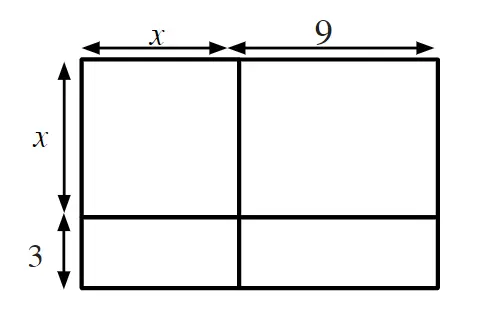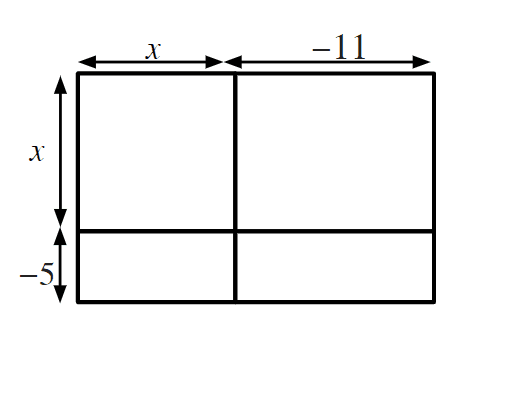Myths about teaching can hold you back


- Year 9
Difference of two squares
I can use the special case when the product of two binomials is the difference of two squares.


- Year 9
Difference of two squares
I can use the special case when the product of two binomials is the difference of two squares.
These resources were made for remote use during the pandemic, not classroom teaching.
Switch to our new teaching resources now - designed by teachers and leading subject experts, and tested in classrooms.
Lesson details
Key learning points
- The product of two binomials often produces three terms.
- There are cases where the coefficient of the linear term is zero.
- The terms in the two binomials can indicate this.
- You can use an area model to explore the structure.
Keywords
Partial product - A partial product refers to any of the multiplication results that lead up to an overall multiplication result.
Binomial - A binomial is an algebraic expression representing the sum or difference of exactly two unlike terms.
Common misconception
Squaring a binomial is the same as just squaring each term. This can then cause confusion with difference of two squares where expanding a pair of binomials does result in just two terms.
Using an area model and taking time to check the partial products each time, particularly with negative terms, should help students to check if they have expanded correctly.
To help you plan your year 9 maths lesson on: Difference of two squares, download all teaching resources for free and adapt to suit your pupils' needs...
To help you plan your year 9 maths lesson on: Difference of two squares, download all teaching resources for free and adapt to suit your pupils' needs.
The starter quiz will activate and check your pupils' prior knowledge, with versions available both with and without answers in PDF format.
We use learning cycles to break down learning into key concepts or ideas linked to the learning outcome. Each learning cycle features explanations with checks for understanding and practice tasks with feedback. All of this is found in our slide decks, ready for you to download and edit. The practice tasks are also available as printable worksheets and some lessons have additional materials with extra material you might need for teaching the lesson.
The assessment exit quiz will test your pupils' understanding of the key learning points.
Our video is a tool for planning, showing how other teachers might teach the lesson, offering helpful tips, modelled explanations and inspiration for your own delivery in the classroom. Plus, you can set it as homework or revision for pupils and keep their learning on track by sharing an online pupil version of this lesson.
Explore more key stage 3 maths lessons from the Expressions and formulae unit, dive into the full secondary maths curriculum, or learn more about lesson planning.

Licence
Prior knowledge starter quiz
6 Questions
Q1.A zero pair is __________.
Q2.Use this area model to help you find the correct expansion of $$(x + 3)(x + 9)$$.

Q3.Use this area model to help you find the correct expansion of $$(x - 5)(x - 11)$$.

Q4.Fill in the missing value in this simplified expansion: $$(x +8)(x - 3)\equiv x^2 +$$ $$x - 24$$.
Q5.Which is the correct expanded form of $$(x - 6)^2$$ ?
Q6.Match each product of two binomials to its correct expansion.
$$(x+3)(x+2)$$ -
$$x^2 + 5x + 6$$
$$(x+3)(x-2)$$ -
$$x^2 + x - 6$$
$$(x+2)(x-3)$$ -
$$x^2 - x - 6$$
$$(x-2)(x-3)$$ -
$$x^2 - 5x + 6$$
$$(x - 6)(x + 1)$$ -
$$x^2 - 5x - 6$$
$$(x + 6)(x -1)$$ -
$$x^2 + 5x - 6$$
Assessment exit quiz
6 Questions
Q1.Match each product of two binomials to its simplified form.
$$(x + 8)(x + 8)$$ -
$$x^2 + 16x + 64$$
$$(x + 8)(x - 8)$$ -
$$x^2 - 64$$
$$(x - 8)(x - 8)$$ -
$$x^2 - 16x + 64$$
Q2.Which of these expressions can be written as the difference of two squares?
Q3.Match each product of two binomials with its simplified form.
$$(x + 2)(x - 2)$$ -
$$x^2 - 4$$
$$(2 + x)(2 - x)$$ -
$$4 - x^2$$
$$(x + 4)(x - 4)$$ -
$$x^2 - 16$$
$$(4 - x)(4 + x)$$ -
$$16 - x^2$$
$$(x - 8)(x + 8)$$ -
$$x^2 - 64$$
$$(8 - x)(8 + x)$$ -
$$64 - x^2$$

